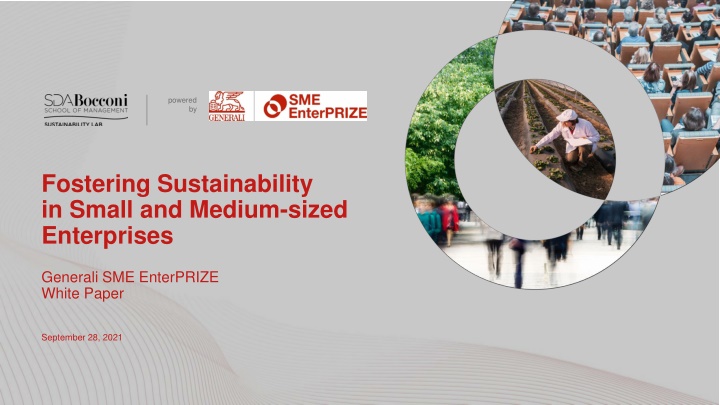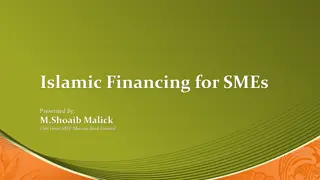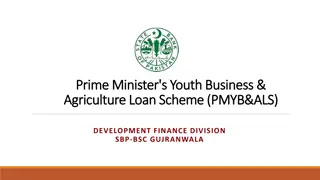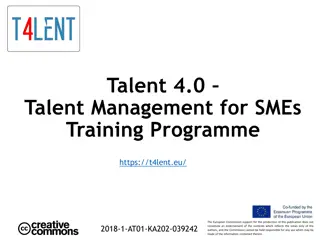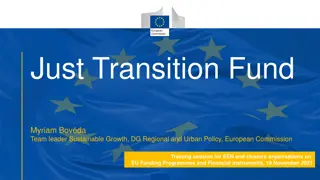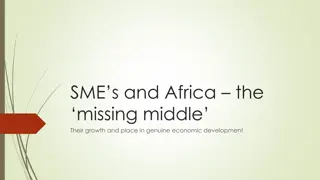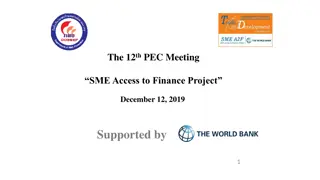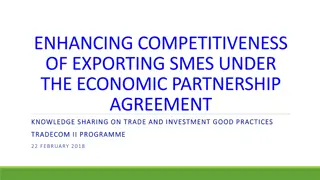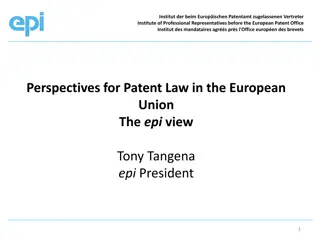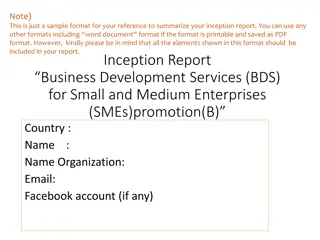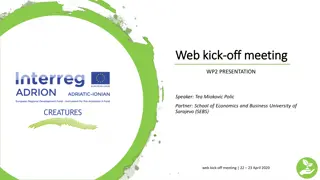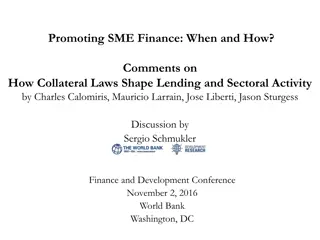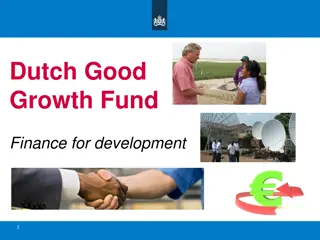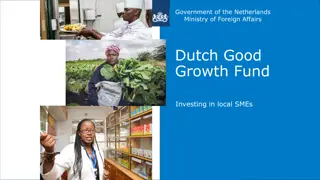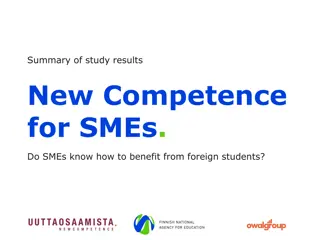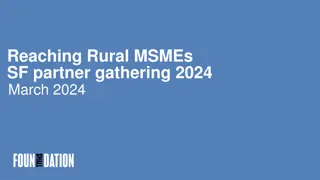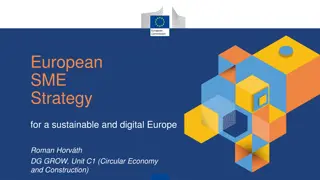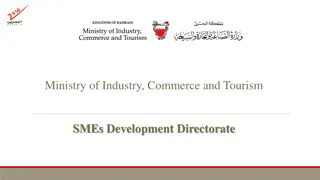Empowering European SMEs for Sustainable Transition: Insights from Generali SME EnterPRIZE White Paper
European SMEs play a crucial role in the EU Sustainable Agenda. The Generali SME EnterPRIZE White Paper focuses on analyzing the sustainability approach of European SMEs, identifying barriers, and mapping drivers for their sustainable transition. The strategic importance of sustainability for SMEs is highlighted, along with the impact of the Covid-19 pandemic on accelerating sustainability dynamics. European SMEs engage in employee welfare, environmental protection, and community initiatives, indicating a growing interest in sustainability strategies.
Download Presentation

Please find below an Image/Link to download the presentation.
The content on the website is provided AS IS for your information and personal use only. It may not be sold, licensed, or shared on other websites without obtaining consent from the author.If you encounter any issues during the download, it is possible that the publisher has removed the file from their server.
You are allowed to download the files provided on this website for personal or commercial use, subject to the condition that they are used lawfully. All files are the property of their respective owners.
The content on the website is provided AS IS for your information and personal use only. It may not be sold, licensed, or shared on other websites without obtaining consent from the author.
E N D
Presentation Transcript
powered by Fostering Sustainability in Small and Medium-sized Enterprises Generali SME EnterPRIZE White Paper September 28, 2021 powered by
Why foster SMEs just sustainable transition? SMEs are crucial in the EU Sustainable Agenda and Sustainability is a strategic factor for SMEs Objectives of the SME EnterPRIZE White Paper and methodology Involving SMEs is paramount to ensure the success of the European Sustainable transition SMEs are a pillar of the European economy and play a central role in community dynamics. They are key players in European and global value chains, which makes them essential in the sustainable transition The White Paper is aimed to analyse European SMEs approach to sustainability, identifying the barriers preventing their activation, while mapping the drivers and tools to foster SMEs just sustainable transition European knowledge network Scientific literature review Grey literature analysis 99% 2/3 56% of businesses in the European Union are SMEs of all private sector employees work in SMEs of the added value created by EU businesses is due to SMEs Analysis of 3,000+ academic papers narrowed down to 120+ articles published in top academic journals Analysis of 100+ reports by international institutions, statistics offices, public and private research centres Activation of a European knowledge network in 8 countries analysing data by national institutions, Universities, business associations, experts, SMEs Sustainability is a strategic factor for SMEs For SMEs, being involved in the sustainability agenda is paramount to obtain or maintain access to key resources and opportunities, such as the access to certified supply chains and global markets, funding for the sustainable transition, better financial conditions, competences, talents, and partnerships Covid-19 pandemic accelerated sustainability dynamics Covid-19 significantly affected European SMEs. Nevertheless, recent surveys confirm that the pandemic is also acting as an accelerator towards sustainability dynamics, driving an higher SMEs activation on social and environmental issues Roundtables with EU MPEs for feedback on the White Paper powered 1 by
What is the strategic approach to sustainability of European SMEs? European SMEs approach to sustainability is still informal and not structured, with margins for growth in fact, European SMEs do more than they are aware of doing and/or are capable of communicating Employee welfare, including occupational health and safety and well-being Initiatives are reported by 66% of SMEs in Italy, 65% in Germany, 76% in Austria, 66% in Spain, 68% in Hungary. French, Czech, and Swiss SMEs significantly engage employees on welfare initiatives too 13% of EU27 SMEs indicate that they have already adopted a sustainability strategy 13% 21% seem to be in the process of implementing one, although they haven t yet done so 21% Environmental protection Initiatives are reported by 67% of SMEs in Italy, 69% in Spain and 66% in Switzerland. 90% of the initiatives reported in Germany by SMEs are related to energy efficiency, whereas French SMEs are mainly focused on environmental design 40% report they may potentially adopt a sustainability strategy in the future 40% 18% declare that they have not considered implementing one and will not do so in the future Community engagement European SMEs confirm being active in supporting social, educational, cultural, as well as charitable and religious-related initiatives in their local communities (e.g. 84% of German SMEs focus their social engagement on supporting social, charitable or church institutions within their community) 18% 8% 8% don t know or not applicable powered 2 by
A joint effort to foster European SMEs just sustainable transition Involved parties Main barriers Sustainability drivers Identified initiatives and instruments Lack of internal resources, including competencies and skills Education, capacity building and transfer of competences Education, capacity building and transfer of competences, including innovation, technology transfer, digitalization Fostering sustainability in SMEs needs the creation of an "ecosystem" of Public and Private actors 1 Public green Credit Guarantee Schemes 2 ESG-linked loans and green/social financial instruments 3 Policy makers, large companies, the world of finance, academia and research, are all called to create public-private partnerships to support SMEs Lack of economic and/or financial resources Sustainable finance ESG-linked insurance initiatives 4 Fintech applications 5 Designated ESG taxonomy for SMEs 6 Institutional factors, including regulations and bureaucracy ESG policy framework Supranational and national regulation on ESG disclosure 7 Extended supply chain responsibility and due diligence 8 ESG-linked tenders in public procurement 9 Public ESG-linked private procurement 10 Lack of consumer or customer demand Demand-side instruments Sustainability linked incentives promoting private demand 11 Public-Private 12 Sustainable supply chain management programmes Soft-regulation, including multi-stakeholder initiatives 13 Lack of routinised, standardised tools for SMEs Disclosure on materiality & assessment Private ESG reporting tools for SMEs 14 ESG assessment and valuation for SMEs 15 Economic instruments Non-economic instruments powered 3 by
Lessons learned and future developments Sustainability drivers Lessons learned and future developments Public, Public-Private and Private initiatives(e.g. Enterprise Europe Network Sustainability Advisors, digital innovation hubs, government-backed plans to accelerate the ecological transition, multistakeholder knowledge-sharing platforms)tostrengthen the transfer of competences, including in the field of innovation, technology and digitalization, to fill SMEs knowledge gap Education, capacity building and transfer of competences Public, Public-Private and Private initiatives(e.g. public green guarantee schemes, ESG-linked loans and green/social financial instruments, ESG-linked financial initiatives, fintech applications) to provide SMEs with dedicated tools to leverage the unprecedented opportunities provided by sustainable finance Sustainable finance Public development/finalisation of a comprehensive policy framework (e.g. EU ESG Taxonomy) with standardized and tailored technical criteria and KPIs proportionate to SMEs capabilities and resources to secure the activation of Small and Medium sized enterprises ESG policy framework Publicand Private initiatives (e.g. central purchasing bodies, municipalities, and other major public procurers leveraging public sustainable procurement; large companies further including ESG criteria in private procurement) to provide additional business opportunities to sustainable SMEs Demand-side instruments Public, Public-Private and Private initiatives (e.g. the foreseen separate and proportionate reporting framework for SMEs envisaged by the recent Corporate Sustainability Reporting Directive (CSRD) proposal; WEF stakeholder capitalism metrics) to enhance SMEs assessment and disclosure on material issues Disclosure on materiality & assessment powered 4 by
